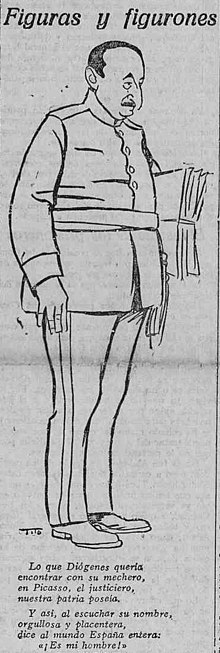
The Picasso File (in Spanish: Expediente Picasso) is the name given to the report written by General Juan Picasso, assigned to the Supreme Council of War and Navy, the highest body of military jurisdiction, in relation to the events that took place in the General Command of Melilla in the months of July and August 1921, known as the "Annual Disaster".
The following year, General Picasso presented his conclusions to the Supreme Council of War and Navy in a four hundred page summary. The government presided by the conservative José Sánchez Guerra then decided to take the Picasso File to the Congress of Deputies, where a first Commission of Responsibilities was formed in July 1922. It presented its verdict (actually there were three) to the Cortes in November, starting an intense debate. In fact, during that time the File became the most important political problem in the country. In July 1923 a second Commission of Responsibilities was formed but it could not issue any verdict because it was prevented from doing so by Primo de Rivera's coup d'état in September 1923. Primo de Rivera closed the Cortes and the file was dismissed.
The Second Spanish Republic, proclaimed in April 1931, formed a new Commission of Responsibilities which focused on the actions of ex-king Alfonso XIII, who was condemned in absentia for "high treason" in November 1931. The new Cortes which emerged from the elections of November 1933, with a majority of the center and the right, transferred the case to the Supreme Court, but on July 9, 1935, the latter ruled that the case should be dismissed because no more punishable acts were found than those already judged (the only sentence passed for the "Disaster of Annual" had been the military arrest of General Dámaso Berenguer for six months). Regarding the possible political responsibilities, the Supreme Court concluded that the only ones that could be derived would be subject "to the judgment of history, and only demandable by public opinion or through its representative bodies".[1][2] There ended the judicial (and political) course of the Picasso File.
- ^ Balado Insunza 2021, p. 92-93.
- ^ Recio García 2018, p. 63; 75; 77.
© MMXXIII Rich X Search. We shall prevail. All rights reserved. Rich X Search
